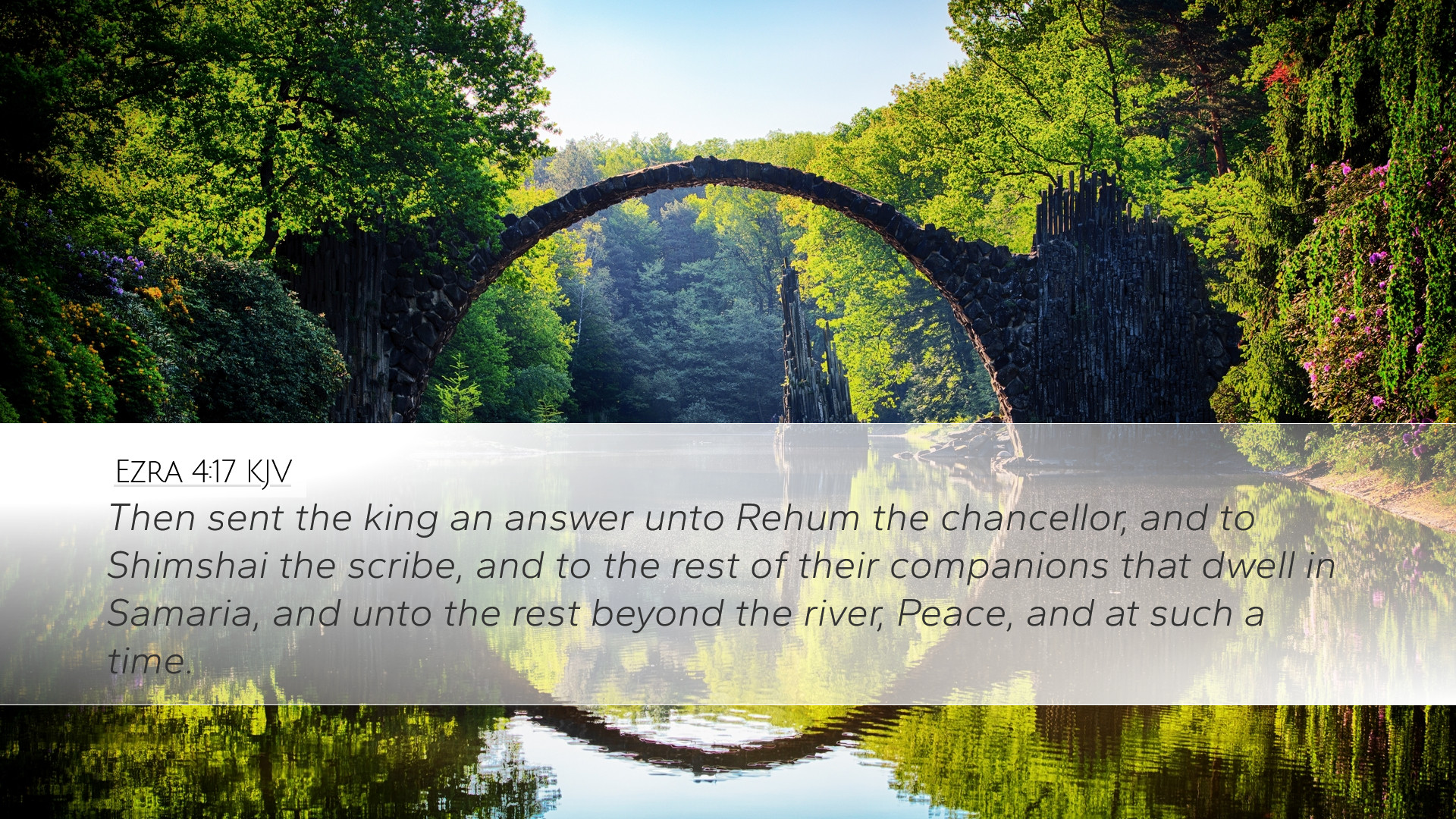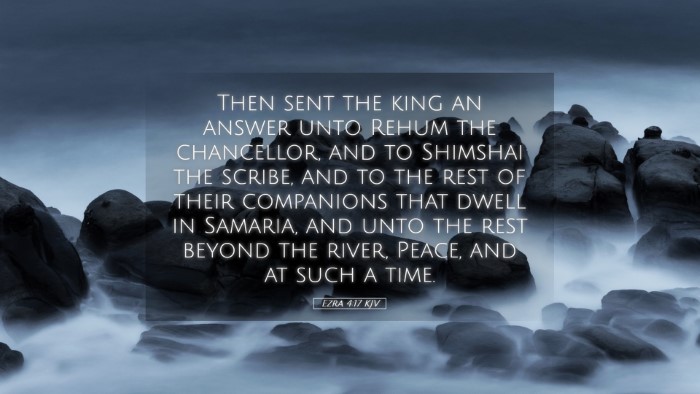Old Testament
Genesis Exodus Leviticus Numbers Deuteronomy Joshua Judges Ruth 1 Samuel 2 Samuel 1 Kings 2 Kings 1 Chronicles 2 Chronicles Ezra Nehemiah Esther Job Psalms Proverbs Ecclesiastes Song of Solomon Isaiah Jeremiah Lamentations Ezekiel Daniel Hosea Joel Amos Obadiah Jonah Micah Nahum Habakkuk Zephaniah Haggai Zechariah MalachiEzra 4:17
Ezra 4:17 KJV
Then sent the king an answer unto Rehum the chancellor, and to Shimshai the scribe, and to the rest of their companions that dwell in Samaria, and unto the rest beyond the river, Peace, and at such a time.
Ezra 4:17 Bible Commentary
Commentary on Ezra 4:17
Ezra 4:17 states: "Then the king sent an answer; unto Rahum the chancellor, and to Shimshai the scribe, and to the rest of their companions that dwell in Samaria, and unto the rest beyond the river, Peace, and at such a time."
Introduction
The context of Ezra 4 reflects a tumultuous period during the rebuilding of the Jerusalem temple after the Babylonian exile. The letters from adversaries seeking to halt the construction present a significant challenge to the returning exiles. The response from King Artaxerxes signifies not only a political maneuver but also reveals the complexities of leadership during this volatile time.
Commentary Insights
Matthew Henry’s Perspective
Matthew Henry elaborates on the adversarial nature of the communications concerning the rebuilding efforts in Jerusalem. He points out that the king's response, directed to Rahum and Shimshai, underscores the precariousness of the situation faced by the Jewish exiles. Henry emphasizes that this correspondence exemplifies a larger theme of opposition towards the restoration of Israel. The dissipating hope among the exiles is palpable, with external forces constantly seeking to undermine their efforts.
Henry posits that the king's letter, while seemingly neutral, bears the weight of authority that could either encourage or impede progress. He draws attention to the use of the greeting "Peace," which is a common refrain in diplomatic letters, suggesting an attempt to calm tensions while simultaneously asserting control over the situation.
Albert Barnes’ Insights
Albert Barnes provides a more detailed historical background, stating that the individuals named in Ezra 4:17 were officials in the Persian administration tasked with overseeing the provinces. Barnes remarks on the significance of their positions and how their influence could sway the policies affecting Jerusalem. He emphasizes that their grievances about the rebuilding efforts were rooted in a desire to protect Persian interests in the region.
Barnes highlights that the king's response is indicative of a broader governmental strategy. By addressing the governor and scribe, Artaxerxes sought to quell any rebellion and enforce stability. Barnes draws a vivid picture of the precarious political landscape where the Jewish people had to navigate the intricacies of politics amidst their spiritual revival.
Adam Clarke’s Analysis
Adam Clarke, in his typical analytical fashion, delves into the implications of the king's missive. He comments on the formal tone of the letter, noting that the king expresses a detachment that may not consider the spiritual importance of the temple's reconstruction to the returning exiles. Clarke raises the point that artifice in political correspondence often lacks genuine concern for the subject at hand—in this case, the spiritual and communal welfare of the Jewish population.
Additionally, Clarke examines the phrase “beyond the river,” which designates the territory under Persian rule. His analysis suggests that this phrase not only locates the exiles geographically but symbolically shows their estrangement from their homeland and the challenges that arise from this separation.
Theological Implications
The exchange in Ezra 4:17 offers profound theological implications that resonate with present-day believers and leaders. Despite the political machinations surrounding the rebuilding of the temple, God's hand remains unperceived by the king and his officials. There is a clear reminder that secular powers often operate under the illusion of control, while God’s larger plans unfold in the background of human history.
Providence and Sovereignty
This verse illustrates God's providence in directing the hearts of kings even amidst opposition. Just as the Jewish people relied on God’s sovereignty for their rebuilding efforts, modern followers of Christ are reminded that worldly authorities cannot thwart the divine plan. Resilient faith in God’s ultimate authority is paramount when faced with resistance, both spiritual and political.
Community and Adversity
The challenges posed by Rahum and Shimshai, and the response from the king, serve as a microcosm of the struggles communities face when restoring their faith and practices amidst adversity. Pastors and leaders today can draw on this narrative to inspire resilience, encouraging congregations to remain steadfast in their mission, even when obstacles appear insurmountable.
Conclusion
In summary, Ezra 4:17 captures a pivotal moment marked by political tension and spiritual yearning. The layered interpretations offered by esteemed commentators—Matthew Henry, Albert Barnes, and Adam Clarke—reveal the depth of the historical narrative along with its implications for communities seeking restoration. It is a call to reflect on both the challenges faced in the past and the eternal truths that remain relevant today as believers navigate their paths in the face of adversity.


